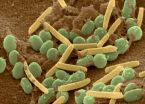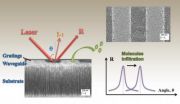(Press-News.org) For cooperation to persist in the often violently competitive realm of bacteria, cheaters must be kept in line.
Two Indiana University Bloomington biologists have learned that in one bacterium, at least, bacterial cooperators can evolve to "police" the cheaters and arrest their bids for dominance.
"Even simple organisms such as bacteria can evolve to suppress social cheaters," said Gregory Velicer, who with Ph.D. student Pauline Manhes has reported the policing behavior in the Proceedings of the National Academy of Sciences.
Their laboratory experiments suggest that cooperative bacteria in nature may evolve to behave in ways that thwart the increase of selfish cheaters. In complex multicellular organisms such as ourselves, cancer cells can be viewed as cheaters that proliferate at the expense of the larger organism. If cancer cells are not successfully "policed" by our healthy cells (and/or medical intervention), the results can be catastrophic. Similarly, the long-term fate of cooperator lineages can be threatened by neighboring cheater lineages in the same social group unless the cooperators are able to migrate away from cheaters or evolve to suppress them.
"Mechanisms that prevent, mitigate or eliminate social conflict among interacting individuals are required for cooperation or multicellularity to succeed," Velicer said. "Policing is one such mechanism. This study shows that bacteria have the potential to evolve behaviors that eliminate fitness advantages derived from cheating within social groups."
Myxococcus xanthus is a predatory bacterium that swarms through soil, killing and eating other microbes by secreting toxic and digestive compounds. When food runs out, cells aggregate and exchange chemical signals to form cooperative, multi-cellular fruiting bodies. Some of the cells create the fruiting body's structure. Other cells are destined to become hardy spores that can survive starvation and other difficult conditions.
In mixed fruiting bodies containing both "cheater" and "cooperator" strains, the cheater strain utilized by Manhes and Velicer does not contribute a social signal required for making spores, whereas the cooperative strain does. Defection from making a social contribution allows cheater cells to "steal" the social signal from cooperators and convert a larger proportion of their cells into spores than do cooperators. Thus, the cheater strain loses to the cooperator strain when they develop in separate groups, but the cheater wins in mixed groups where they directly interact with cooperators.
The scientists mixed cooperative and cheating strains of M. xanthus and allowed cooperator lineages -- but not the cheater -- to evolve under starvation conditions in which cooperative construction of fruiting bodies is important for survival. They then watched to see how replicate lineages descended from the cooperator strain would evolve while repeatedly encountering the same non-evolving cheater over many consecutive cycles of fruiting body development.
Both strains were exposed to an antibiotic during a growth phase after each cycle of development. Cheater cells are sensitive to the antibiotic and were killed off, whereas cooperator cells were resistant to the antibiotic and their populations could continue growing and evolving. The same non-evolving cheater strain was reintroduced to the evolving cooperator lineages at the beginning of each cycle of fruiting body development and removed at the end of each cycle.
The evolution experiment was allowed to run for 20 cycles of development.
"We tested whether cooperators adapted to the presence of a cheater mainly by changing their social interactions with that cheater or by improving their spore production in a way that is independent of their social environment," Manhes said. "We found that the lineages descended from the cooperative ancestor evolved novel interactions with the cheater that improved their fitness."
The policing behavior was described as "selfish" because suppression of the cheaters directly benefited the evolved populations themselves rather than being self-sacrificial for the benefit of others. That being said, the selfish police actually do strongly benefit cooperator cells in at least one social context. In mixed groups that include three players -- the evolved cells, the cheater and the ancestral cooperator -- the ancestor produced far more spores than it did when it was mixed with only the cheater.
The evolving populations might have gained the ability to suppress cheaters by a variety of mechanisms, Velicer said.
For example, the descendants of the ancestral cooperator might have evolved a general anti-competitor trait that generically harms a variety of potential competitors to a similar degree, but this did not occur. Rather, the cooperator lineages evolved behaviors that are particularly harmful to the non-evolving cheater. "We would like to investigate the molecular basis of cheater suppression," Velicer said, "in particular whether it is due to the positive production of a compound that is uniquely detrimental to the cheater or some other mechanism."
The scientists competed the strains that evolved to deal with the cheater against their cooperative ancestor, both with the cheater present in the same group and without the cheater. They found that most evolved populations strongly outcompeted their ancestor only when the cheater was present. This result showed that much of the adaptation that took place during the evolution experiment was a specific evolutionary response to the presence of cheater cells.
In an intriguing reversal of fate, some of the replicate populations that evolved from the cooperative ancestor actually became cheaters themselves, but of a new kind. These new cheaters differed from the non-evolving cheater (the one that was mixed with the evolving populations during every round of development) and in some cases could socially exploit both the cooperative ancestor and the non-evolving cheater itself.
This study may cast a shadow on recent proposals that cheaters might be used to thwart infections of bacteria that cooperate with each other to cause disease in humans. The basic idea of such proposals is to introduce cheaters that will disrupt the social cohesion of infecting bacterial populations. However, just as bacteria readily evolve resistance to antibiotics, cooperative bacteria that infect humans or animals may evolve to beat the cheats.
INFORMATION:
This work was supported by a grant from the National Institutes of Health (GM079690).
'Policing' stops cheaters from dominating groups of cooperative bacteria
2011-05-27
ELSE PRESS RELEASES FROM THIS DATE:
Estimating landfill gas potential
2011-05-27
Research suggests that landfill gas-recovery projects should be implemented quickly if the maximum amount of methane gas is to be retrieved from organic waste in as short as time as possible, according to a study published in the latest issue of the International Journal of Environment and Waste Management.
Through appropriate management, landfill can be used to generate an alternative fuel gas containing that has half the caloric value of natural gas. Landfill gas (LFG) comprises approximately 50% methane and 50% carbon dioxide. However, such management requires significant ...
AsiaRooms.com - Enjoy Bats at Wetlands in Hong Kong
2011-05-27
Bats at Wetlands is sure to be a popular exhibition for fans of the winged animal who visit the wildlife park.
It has been organised as part of the venue's fifth anniversary and will be running until October 31st 2011.
In a statement, the organisers said: "Visitors may discover the fun facts about the behaviour, cultural symbolism and conservation research projects on bats through a wide range of high-tech games, videos, interactive panels and interpretation sessions."
They went on to point out that the animal has a special significance in Hong Kong, ...
Cognitive decline incidence higher in Southern stroke belt
2011-05-27
New research shows that residents of the Stroke Belt—a southern portion of the U.S. with significantly elevated stroke morality rate—also have a greater incidence of cognitive decline than other regions of the country. Researchers believe shared risk factors among members of this population are to blame. Results of this study, funded by the National Institute of Neurological Disorders and Stroke (NINDS), are published in Annals of Neurology, a journal of the American Neurological Association.
In 1965 the Stroke Belt first appeared in medical literature to describe the ...
Neurologix presents 1-year data from phase 2 study of NLX-P101 in Parksinson's disease
2011-05-27
FORT LEE, N.J., May 26, 2011 -- Neurologix, Inc. (OTCBB: NRGX) announced the presentation today of efficacy results through one year of follow-up in patients treated as part of the Company's successful Phase 2 clinical trial for its novel, investigational gene therapy NLX-P101 for the treatment of Parkinson's disease (PD). Improvements in the Unified Parkinson's Disease Rating Scale (UPDRS) at 12 months for the randomized, double-blind, sham surgery-controlled trial of 45 subjects with advanced PD confirmed that patients treated with NLX-P101 experienced sustained, positive, ...
Precision-tinted lenses offer real migraine relief, reveals new study
2011-05-27
EAST LANSING, Mich. — For the first time, researchers have shown why precision-tinted lenses reduce headaches for migraine sufferers, a finding that could help improve treatment options for patients battling the debilitating ailment.
Jie Huang of Michigan State University's Department of Radiology used functional magnetic resonance imaging, or fMRI, to reveal how precision-tinted lenses normalize brain activity in patients with migraine headaches, preventing such attacks.
Huang's research appears in the current edition of the journal Cephalalgia, published by SAGE.
While ...
AsiaRooms.com - Check Out Portrait of Moscow at Seoul Museum of History
2011-05-27
Portrait of Moscow has opened at the Seoul Museum of History (SMH), offering visitors a chance to learn about a broad period of Russia's past.
Images in the collection date from modern times all the way back to the late 19th century, with each one providing a snapshot of the political or social context in which it was taken.
There are 80 pictures to view, all of which have been borrowed from the Moscow City Museum (MCM).
Attendees will find the exhibition split into four sections, with one featuring historical images, another looking at scenes from Moscow's Soviet ...
Improving DNA sequencing: Sponge-like biosensor crams enormous power into tiny space
2011-05-27
WASHINGTON, May 26—Vanderbilt University engineers have created a "spongy" silicon biosensor that shows promise not only for medical diagnostics, but also for the detection of dangerous toxins and other tiny molecules in the environment. This innovation was originally designed to detect the presence of particular DNA sequences, which can be extremely helpful in identifying whether or not a person is predisposed to heart disease or certain kinds of cancer. The new sensor is described in the Optical Society's open access journal, Optics Express.
Biological chemical sensors ...
AsiaRooms.com - Singapore Open Super Series 2011 Starts in June
2011-05-27
Next month will see some of the top badminton players in the world congregate for the Singapore Open Super Series 2011.
Running from June 14th to 19th, the event is one of the highlights of the country's badminton calendar.
It takes place at the Singapore Indoor Stadium and will give attendees the chance to see the best players on the domestic scene take on international stars.
Some names to watch out for are Danny Bawa Christnanta, Vannessa Neo and Hendra Wijaya. They all came home from the recent Li Ning New Zealand International Challenge 2011 with trophies.
Christnanta ...
San Diego Daily Deals Site Sets Record
2011-05-27
San Diego's leading news site SignOnSanDiego.com recently partnered with digital agency Cuker Interactive to redesign Daily Deals, a service featuring deals of up to 90 percent off of local restaurants, attractions, and services. Located at http://dailydeal.signonsandiego.com, the program allows users to sign up to receive email notifications for daily deals, share them with friends and family, and earn credits for referral purchases. Since the site launched in March, the Daily Deals site has generated significant revenue, including a record-setting $366,035 through a single ...
Factors in berry-splitting in blueberries examined
2011-05-27
This release is available in Spanish.
U.S. Department of Agriculture (USDA) researchers and a university colleague have found several factors involved in blueberry splitting, a significant problem that can cause losses of $300 to $500 per acre.
Splitting and cracking occur in southern highbush and rabbiteye blueberries if they receive preharvest rainfall when fully ripe or approaching ripeness, according to scientists with USDA's Agricultural Research Service (ARS). ARS is USDA's principal intramural scientific research agency.
ARS horticulturist Donna Marshall, retired ...



